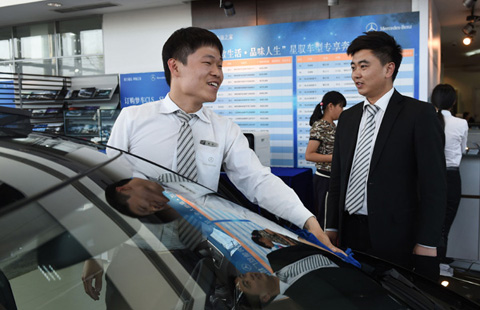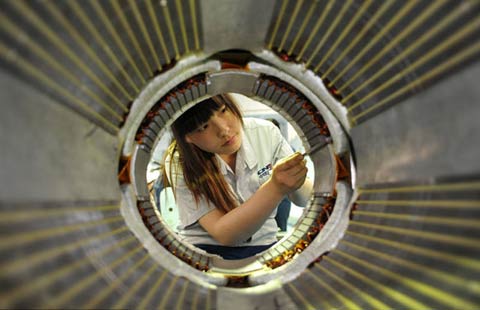Chinese firms lift US employment
By AMY HE (China Daily) Updated: 2015-05-22 07:14
|
 |
|
Job seekers wait in a line at a job fair in Southfield, Michigan on June 15, 2011. [Photo/IC] |
Investments spur innovation, competitiveness and change how both sides think, says report
Despite fears from United States politicians and companies about jobs being outsourced to China, investment from China has created 80,000 jobs in the US, up from fewer than 15,000 five years ago, and the number could reach 200,000 to 400,000 soon, said a report released on Wednesday.
Chinese companies invested about $46 billion in the US between 2000 and 2014, creating more than 1,500 businesses in the country, and the amount could increase to between $100 billion and $200 billion by 2020, said the study sponsored by the National Committee on US-China Relations and done by US research firm Rhodium Group LLC. The report is the first detailed analysis of Chinese investment by congressional district.
"What was a trickle has become a stream, and it's probably going to become a river," said Stephen Orlin, president of the US-China Relations Committee, a nonprofit organization that promotes understanding between the US and China, at a news conference in New York where the report was released.
"Chinese capital is providing 80,000 jobs today, and will likely provide between 200,000 and 400,000 jobs at the end of this decade. It will change the way many Chinese and Americans think about each other," he said.
The top US states for Chinese investments are California, Texas, North Carolina, Illinois and New York, according to the study.
Between 2000 and 2014, North Carolina's fourth congressional district received the most direct investment-$3.36 billion-followed by the seventh district in Illinois with $3.21 billion, and the 12th district in New York with $2.25 billion.
As for employment by Chinese companies, North Carolina is No 1, with 15,000 jobs. The state has a significant number of people employed by Smithfield Foods Inc, which was bought by Shuanghui Group, based in Luohe, Henan province, in 2013. Smithfield's headquarters is in Virginia, and it has production facilities throughout the country.
The second-largest employer in North Carolina is Beijing-based Lenovo Group Ltd. In 2005, Lenovo acquired IBM's personal computer business including its operations in the Research Triangle region
The report said that investments in perceived trophy assets such as the Waldorf Astoria hotel dominate the headlines, but "Chinese firms are clearly interested in the value of American workers and manufacturing in some of the areas with the lowest per capita incomes in the US as well. The benefits of Chinese capital are distributed worldwide, not just in high-income parts of the country".
Chinese companies have created the largest number of jobs in the manufacturing and services sectors, which hold a higher number of jobs compared with the energy and real estate sectors, the report said.
"Fears that Chinese companies could systematically move acquired assets and related jobs back to China have not materialized," the report said.
Thomasville, Alabama, is one of the cities that has benefited from Chinese investment and was profiled in the report. Last May, officials held a ribbon-cutting ceremony for Golden Dragon Precise Cooper Tube Group Inc's first US factory, located in Wilcox County, which was selected as the location from about 70 US cities that expressed interested in having the plant.
"We had people in the town who were like, 'the Chinese are coming, the Chinese are coming!' they didn't know how to act, they didn't know how to accept this investment," recalled Sheldon Day, mayor of Thomasville, during the event. "But when they found out that Alabamians-our folks-were going to be the people to receive the jobs, then it became a great project for us."
Chinese investment has also fostered American innovation and competitiveness, the report said. Companies from China are spending millions on research and development in the US and "innovation clusters" in the US are benefiting.
"Higher levels of investment mark the beginning of an era of US-China economic engagement that brings a wider array of mutual benefits rather than a limited set of winners and losers, as arose from the deepening of goods trade of the past two decades," the report said.
- Brazil embraces third wave of Chinese investment
- Bloomberg: Chinese investment sustains US cities
- Guangdong seeks overseas Chinese investment fund
- Chinese investment surges in Canadian commercial real estate
- Chinese investment in French airport no threat to region's interests
- Chinese investment helps ANU develop new electronic devices
- The dying craft of balance scales
- Convenience stores to lead retail push
- China aims to be leader in robotics
- CIC subsidiary to focus on overseas targets
- Top 10 highest-paid white-collar jobs in China
- Women buying into online economy
- Chinese firms lift US employment
- Rural e-commerce portal is first to target domestic farmers

















